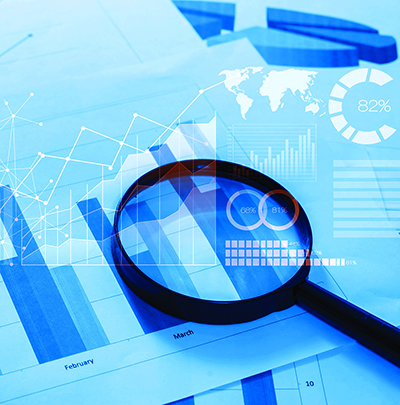Sorry, but your login has failed. Please recheck your login information and resubmit. If your subscription has expired, renew here.
January-February 2018
If you frequent supply chain conferences, as I do, you’ve probably noticed that some of the best-attended sessions are the ones that focus on emerging technologies—or what we’re calling the NextGen Supply Chain. You may have noticed something else: While topics like Big Data, artificial intelligence, augmented reality, blockchain and robotics play to standing room audiences, there’s a lot of confusion about what to do with the information. At the 2016 APICS conference, one member of the audience asked a direct question at the end of an excellent session on Big Data by Hannah Kain, the CEO of Alom: “This sounds great. But there’s not a… Browse this issue archive.Need Help? Contact customer service 847-559-7581 More options
In 2015, The Economist magazine famously dubbed blockchain technology “the trust machine” owing to its ability to create trust in business networks. This capability resonates strongly in the supply chain world, where a lack of trust is a major obstacle to high-level collaboration. The promise of blockchain may be fulfilled in time, but at present its progress is impeded by—ironically—a lack of trust in the technology.
To some extent the problem has its roots in the industry’s healthy skepticism of much-hyped innovations. But there are other trust issues related to the way that supply chains operate. The challenge for blockchain developers and proponents is how to reconcile the technology with these misgivings.
This was a central theme at the recent “Blockchain in Supply Chain: Looking Beyond the Hype” roundtable hosted by the MIT Center for Transportation & Logistics. At the event, some 30 organizations talked frankly about the potential benefits of blockchain in the supply chain domain.
Delivering on the promise
Blockchain is a secure, distributed ledger of transactions that can update all authorized users in real time. All records are timestamped and unchangeable. It has the potential to be a powerful technology from a supply chain perspective because it offers the possibility of a single source of truth that facilitates the kind of collaboration that the industry has long struggled to achieve.
That’s the promise. And a slew of test projects in 2017—with many more slated for 2018 as well as some possible deployments—suggest the promise is attainable. But supply chain is far from a greenfield application. To deliver, blockchain must adapt to ingrained supply chain practices.

This complete article is available to subscribers only.
Log in now for full access or start your PLUS+ subscription for instant access.
SC
MR
Sorry, but your login has failed. Please recheck your login information and resubmit. If your subscription has expired, renew here.
January-February 2018
If you frequent supply chain conferences, as I do, you’ve probably noticed that some of the best-attended sessions are the ones that focus on emerging technologies—or what we’re calling the NextGen Supply Chain.… Browse this issue archive. Access your online digital edition. Download a PDF file of the January-February 2018 issue.In 2015, The Economist magazine famously dubbed blockchain technology “the trust machine” owing to its ability to create trust in business networks. This capability resonates strongly in the supply chain world, where a lack of trust is a major obstacle to high-level collaboration. The promise of blockchain may be fulfilled in time, but at present its progress is impeded by—ironically—a lack of trust in the technology.
To some extent the problem has its roots in the industry's healthy skepticism of much-hyped innovations. But there are other trust issues related to the way that supply chains operate. The challenge for blockchain developers and proponents is how to reconcile the technology with these misgivings.
This was a central theme at the recent “Blockchain in Supply Chain: Looking Beyond the Hype” roundtable hosted by the MIT Center for Transportation & Logistics. At the event, some 30 organizations talked frankly about the potential benefits of blockchain in the supply chain domain.
Delivering on the promise
Blockchain is a secure, distributed ledger of transactions that can update all authorized users in real time. All records are timestamped and unchangeable. It has the potential to be a powerful technology from a supply chain perspective because it offers the possibility of a single source of truth that facilitates the kind of collaboration that the industry has long struggled to achieve.
That's the promise. And a slew of test projects in 2017—with many more slated for 2018 as well as some possible deployments—suggest the promise is attainable. But supply chain is far from a greenfield application. To deliver, blockchain must adapt to ingrained supply chain practices.
 SUBSCRIBERS: Click here to download PDF of the full article.
SUBSCRIBERS: Click here to download PDF of the full article.
SC
MR


Latest Supply Chain News
Latest Podcast

 Explore
Explore
Topics
Software & Technology News
- Looking back at NextGen 2024
- AI is moving omnichannel closer to the customer
- How technological innovation is paving the way for a carbon-free future in logistics and supply chains
- Körber Supply Chain Software’s Craig Moore says MercuryGate acquisition is about the customer
- Robotic use grows by 10%
- Harnessing Edge Computing and AI Vision Systems for Real-Time Logistics Insights
- More Software & Technology
Latest Software & Technology Resources

Subscribe

Supply Chain Management Review delivers the best industry content.

Editors’ Picks





